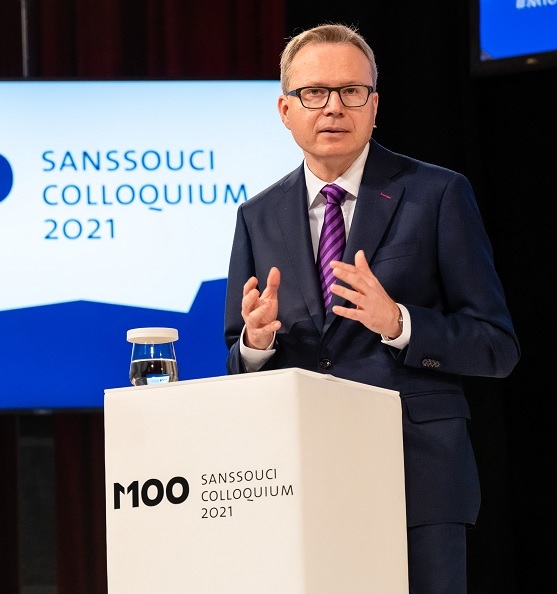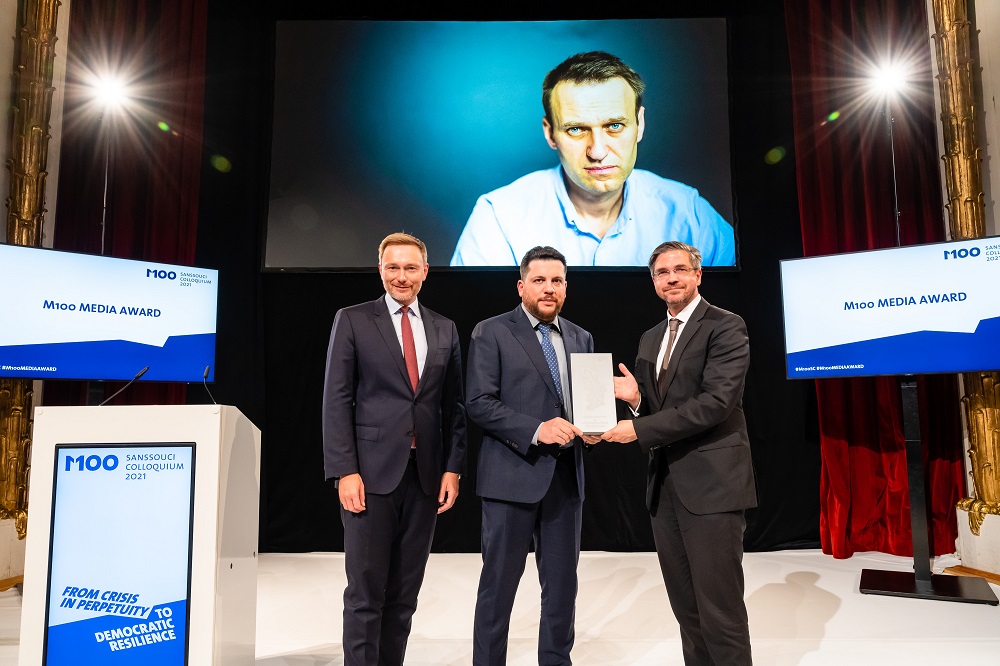Potsdam, 7 October 2021. With the presentation of the M100 Media Award to Russian opposition politician Alexei Navalny and his anti-corruption foundation FBK, the international media conference M100 Sanssouci Colloquium came to a glittering and moving conclusion last night at the Palace Theatre in the Neues Palais. Instead of the imprisoned Navalny, his campaign manager and close confidant Leonid Volkov accepted the award, which was presented to him by Potsdam’s Lord Mayor Mike Schubert. The laudation was given by FDP leader Christian Lindner, who, in the midst of exciting coalition negotiations, took the time to give the central political speech of the M100 Sanssouci Colloquium for the second time since 2018.
Under the title “From Crisis in Perpetuity to Democratic Resilience”, around 80 international representatives from the media, politics and academia had previously discussed in a virtual format the challenges currently facing politics, society, academia and the media and how the resilience of democracy can be strengthened.

M100 Media Award: “A freedom fighter who has become a symbolic figure”
In his welcoming speech at the beginning of the M100 Media Award ceremony, Potsdam’s Lord Mayor Mike Schubert emphasised the importance of defending the fundamental values of a democratic society. “Democratic resilience has not only played a role since the Corona pandemic,” he said. “In a society that is becoming more and more individualised, the question of strengthening the value of community, is now again more important than ever if we don’t want to watch our society atomise into a horde of individualists.” With all the plurality of opinions, “tolerance must find its limit in the defence against anti-human and anti-democratic statements. The prerequisite for a democratic community is the protection of human and fundamental rights and the affirmation of democracy as a form of society. And in my view, all powers must make their contribution to this.” (Read the entire speech here.)

Christian Lindner, who has been campaigning for the release of Navalny for months, emphasised in his laudation that opposition activists in authoritarian states must not be forgotten and that everyone has a responsibility to do the same to Alexei Navalny and the activists in the FBK in their commitment to freedom. The pursuit of freedom is always stronger in the long run than power and oppression. “Both the poisoning and the imprisonment and the ever new trials for alleged ‘extremist behaviour’ of Alexei Navalny and his team are internationally unacceptable,” Lindner said. “Public and political pressure must be maintained. An attempted poison assassination is a breach of civilisation that we cannot accept.” Lindner stressed that we must “take tough action against false rulers and venal elites”, “but at the same time open our hearts to innocent civilians.” He said there is a need for constructive dialogue with Russia, but one that also clearly names human rights violations.” “Just as we take the concerns of the Hong Kong people seriously, we also recognise Alexei Navalny as a freedom fighter who has become a symbolic figure. With Navalny, we share the core values of democracy, the rule of law and freedom.” (The entire speech can be read here.)

The award for Navalny and his anti-corruption foundation FBK was accepted by Leonid Volkov, chief of staff and political director of Navalny’s team and responsible for the Russian smart voting app. The M100 Media Award is also a special award because it honours not only Navalny, but also the entire team of the foundation, Volkov said. “Through journalism, through the written and spoken word, through storytelling, Alexei Navalny has become what he is, Putin’s main rival and public enemy number one. In doing so, he shares the fate of so many journalists around the world who are persecuted for telling the truth.” The FBK team around Navalny is not defeated, Volkov said, but is more sure of their cause than ever before. The fight for human rights begins with the elimination of corruption. This fight against corruption is global, as freedom of speech and freedom of the press are at stake. Time, patience and persistence are required. (Please click for the entire speech here.)
With the choice of Navalny, the advisory board of the M100 Sanssouci Colloquium, chaired by Potsdam Mayor Mike Schubert, sends a clear signal about the importance of defending European values through an independent opposition and civil society, fair judicial procedures and the right to exercise basic human rights. The award also serves as a symbol for nearly 400 political prisoners in Russia, for murdered politicians and journalists and for the fight against increasing autocracy in Europe.
M100 Sanssouci Colloquium: Resilience as a Keyword of the Post-Corona Era
In the afternoon, the international media conference took place in a digital format. In his opening speech on “The Revenge of The Real: Politics for a Post-Pandemic World“, the American sociologist, architecture and design theorist Benjamin H. Bratton, Professor of Fine Arts at the University of California, San Diego, emphasised that the COVID-19 pandemic was evidence of the crisis of capacity – and political imagination – in the West and called for a “positive”, including data-driven, “biopolitics” in response. The solution is not artificial intelligence and big data, as practised by Facebook and Co. with their “over-individualised user profiles and predictions about the next wish, click or purchase”. But if a society refuses to “know and shape its own biological realities by rejecting the means for modelling”, it commits a “violence of neglect” against itself. (You can read and watch Benjamn H. Bratton’s speech here.)
Subsequently, in three parallel Strategic Roundtables, conference participants discussed characteristics and preconditions of democratic resilience along the themes of leadership in (post-)Corona times, Europe’s role in the world and the relationship between science and journalism.

At 5 p.m., Prof. Dr. Andreas Reckwitz, Professor of General Sociology and Cultural Sociology at the Humboldt University in Berlin, continued on the stage of the baroque palace theatre in front of an audience with a speech on the topic of “Resilience in late Modernity”. Resilience could become a keyword of the post-Corona era, for the politics of the 21st century as a whole, according to Reckwitz. If one wants to derive a comprehensible lesson from dealing with the pandemic, then societies must become more resilient and “individuals should work on their psyche so that they gain resilience, and the state should provide society with a framework for this.” Societies emerge better from crises when there is trust in institutions. Like individuals, they must learn “that they cannot plan the future completely”. At the state level, however, there is a fine line between a risk prevention regime and a high-security policy, both during the pandemic and in the face of climate change. Reckwitz: “You have to bear with the fact that societal risks cannot be reduced to zero.” (Please find Andreas Reckwitz’ speech here.)

At the subsequent Special Talk on “The Totalitarian Temptation”, Saad Mohseni, Afghan-Australian media entrepreneur and co-founder and chairman of the MOBY Group, Dr Claudia Major, head of the International Security Department at the German Institute for International and Security Affairs (SWP), and Dr Can Dündar, top Turkish journalist and editor-in-chief of Özgurüz, discussed the state of democracy and reasons for rising totalitarianism in the world. Moderation by international TV presenter Ali Aslan.
You can find the recording of the event in full length here (the broadcast starts at minute 19:00). We will post a written summary of the Special Talk and all speeces in full lenght on the website as soon as possible.
The M100 Media Award has been presented annually since 2005 as part of the international media conference M100 Sanssouci Colloquium to personalities who stand up for democracy, European understanding and freedom of opinion and the press. Previous awardees include Bob Geldof, Hans-Dietrich Genscher, the Danish cartoonist Kurt Westergaard, Vitali Klitschko, “The Standing Man” Erdem Gündüz, the French satirical magazine Charlie Hebdo, the Italian writer Roberto Saviano, the journalist Deniz Yücel, the Scottish Prime Minister Nicola Sturgeon, and the Hungarian journalist Szabolcs Dull.
M100 is an initiative of Potsdam Media International e.V.in cooperation with the Institute for Media and Communication Policy (IfM) and funded primarily by the City of Potsdam. Further sponsors include the Medienboard Berlin-Brandenburg, the German Foreign Office, the National Endowment for Democracy (NED) and the Friedrich Naumann Foundation. Cooperation partners: Prussian Palaces and Gardens Foundation (SPSG), Reporters Without Borders (RoG), Human Rights Watch, Association of German Newspaper Publishers (VDZ), MediaTenor. Sponsors: Medienlabor, Telekom, Federation of German Independent Professionals (BFB).

